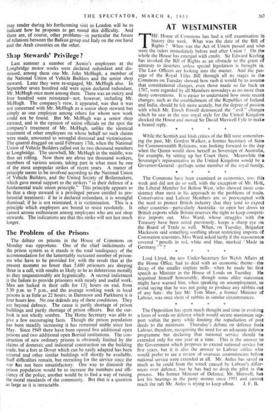AT WESTMINSTER
THE_ House of Commons has had a stiff examination in history this week. What was the date of the Bill of Rights ? When was the Act of Union passed and who were the rulers immediately before and after Union ? On the whole the House has emerged with credit. Sir Edward Keeling has invoked the Bill of Rights as an obstacle to the grant of amnesty to deserters unless special legislation is brought in. The Law Officers are looking into the matter. And the pas- sage of the Royal Titles Bill through all its stages in the Commons on Tuesday showed how rash it would be to assume that constitutional changes, even those made so far back as 1707, were regarded by all Members nowadays as no more than dusty conventions. It is easier to understand how more recent changes, such as the establishment of the Republics of Ireland and India, should be felt more acutely, but the degree of passion with which Mr. Enoch Powell denounced the " evil " changes which he saw in the new royal style for the United Kingdom shocked the House and moved Sir David Maxwell Fyfe to make a heated reply.
* While the Scottish and Irish critics of the Bill were remember- ing the past, Mr. Gordon Walker, a former Secretary of State for Commonwealth Relations, was looking forward to the day when the Queen would show herself as Sovereign of Australia. for example, by setting up her Court there. Meanwhile the Sovereign's representative in the United Kingdom would be a Governor-General—perhaps some member of the royal family.
* The Commons have been examined in economics, too, this week and did not do so well, with the exception of Mr. Holt. the Liberal Member for Bolton West, who showed more. con- sistency than most in his approach to the problems of trade. Conservative and Labour Members are so preoccupied with the need to protect British industry that they tend to expect other countries---Tarticularly Australia—to open her doors to British exports while Britain reserves the right to keep competi- tive imports out. Miss Ward, whose struggles with the Treasury have been noted previously, keeps a sharp eye on the Board of Trade as well. When, on Tuesday, Brigadier Mackeson said something soothing about restricting imports of Coronation souvenirs. Miss Ward asked tartly if the reassurance covered " pencils in red, white and blue, marked ` Made in Germany ' " ? * ** Lord Lloyd, the new Under-Secretary for Welsh Affairs at the Home' Office, had to deal with an economic theme—the decay of the smaller tinplate mills—when he made his first speech as Minister in the House of Lords on Tuesday. He acquitted himself honourably, though some elder statesman might have warned him, when speaking on unemployment, to avoid saying that he was not going to produce any rabbits out of any hats : the late Mr. Tom Shaw, a former Minister of Labour, was once short of rabbits in similar circumstances.
* * The Opposition has spent much thought and time in evolving a form of words on defence which would secure maximum sup- port within the party while limiting the repudiation of past deeds to the minimum. Thursday's debate on defence finds Labour, therefore. recognising the need for an adequate defence programme but declaring that national service should be extended only for one year at a time. This is the answer to the Government which proposes to extend national service for five years, but it is also the answer to Labour critics who would prefer to see a review of overseas commitments before national service were extended at all. Mr. Attlee has saved as much as he could from the wreck caused by Labour's differ- ences over defence, but he has had to drop the pilot in the process. His former Minister of Defence, Mr. Shinwell, has lost his bearings in the party storms since 1951 and cannot reach the raft Mr. Attlee is trying to keep afloat. J. F. B.


































 Previous page
Previous page